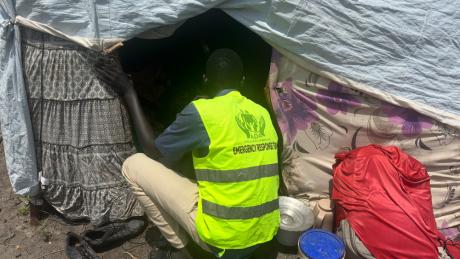
A Cordaid team visited the transit centre in Renk where they witnessed the unfolding humanitarian crisis on South Sudan’s northern border where thousands of refugees continue to arrive every day. The team share their insight and analysis of the situation as they prepare to launch a response.
Although the ground is mostly dry after a downpour two days ago, it’s easy to imagine the impact of tens of thousands of refugee feet churning up the bare ground as people look for food, water and healthcare. Cordaid Country Director, Tom, sums up the scene as a ‘crisis waiting to happen. If it rains it will be bad,’ he reflects.
Each of the five senior managers observe the situation with a well-trained eye, noting that makeshift shelters occupy every available space. ‘The situation is really bad, actually. Until you go there to see what is happening, you cannot know the level of needs that are there,’ explains Health Programme Manager Andrew Ngugi, in light of his own experience. ‘It is always bad in refugee camps, but it should not be that bad,’ he says.
Security and Safety Manager Mathou Makueng, saw the influx of people first-hand. ‘The camp is overflowing, and some people are having to stay outside in the open. At night it gets really cold and these people don’t have anything. They are staying in the bushes for protection with just a bed sheet over their heads. We heard from the community leaders that they are receiving 1,000 people every day. The majority of them are children. Three more trucks arrived bringing hundreds more refugees while we were there,’ he says sadly.
The situation is really bad, actually. Until you go there to see what is happening, you cannot know the level of needs that are there.
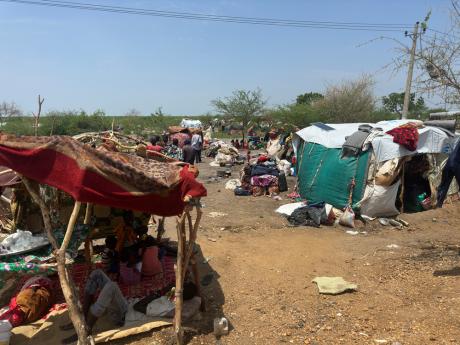
Heartbreak and hope
Three months after the conflict ignited in Sudan’s capital Khartoum, most of the refugees arriving on trucks and donkey carts have already been robbed of their few possessions, escaping a lawless country where military forces with a mandate to protect the people have turned on them instead. Stories of heart-breaking separations are all too common as Mathou explains. ‘When the crisis happened, people fleeing Sudan lost contact with family members because they all ran in different directions. Some lost their children, and they don’t know where they are. They found their own way out of Sudan but don’t know what happened to their relatives because they don’t have a phone.’
Country Director Tom Otieno recalls the experience of one refugee, who was just grateful to reach a place of safety: ‘The lady, who had just come two days before, said it was the first time she slept without worrying about gunshots or someone dropping a bomb. She slept outside but still felt relief that no-one is trying to kill her anymore. Even in the midst of all the problems in the camp she felt relief,’ Tom reflects incredulously. ‘That was really touching. It reminded me that peace is priceless. You cannot put a value on peace. If you take peace for granted, you don’t know what war can do.’
It reminded me that peace is priceless. You cannot put a value on peace. If you take peace for granted, you don't know what war can do.
Health crisis
The challenges in the overcrowded camp are enormous as Humanitarian Aid Programme Manager Bashir James outlines: ‘Shelter is the most pressing need, as most people are sleeping outside during the rainy season or crowded in one centre. Children and the elderly face the severe impact of the rains because they are prone to pneumonia,’ he says.
Bashir said that measles is spreading rapidly in the overcrowded conditions of the camp. ‘We are seeing an upward spike in the cases of measles in the camp. We were talking to people and hearing that three to four children are dying of measles every day. In a place called Jodda at the border, they are entering the country with measles. It is very contagious and spreading to the surrounding locations as well as in the camp.’
The overcrowded conditions and wet-season downpours are exposing the refugees to sicknesses like malaria (due to the presence of standing water where mosquitos can breed) and skin conditions contracted from bathing in dirty water. ‘The water supply is insufficient for the increasing population and open defecation is widespread because the sanitation facilities are not sufficient for the number of people,’ Bashir says.
The greatest concern, explained by Country Director Tom, is the potential for an outbreak of cholera. ‘There is a high chance of getting cholera in a camp with limited sanitation facilities, where people are doing open defecation, because the defecate matter goes into that water when it rains. People who don’t have access to water will drink anything that comes their way,’ he noted sadly.
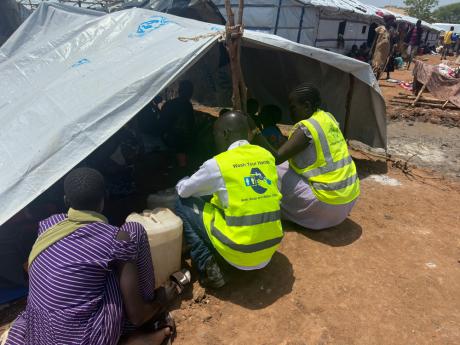
Help where it's needed
Cordaid are launching a nutrition programme through local partner Africa Development Aid which has a presence on the ground. ‘We have a project starting soon to tackle malnutrition, because that’s a challenge that needs to be addressed. We are sending a staff to that location as soon as possible. As our response, we plan to scale up what we are already doing,’ Tom says.
Cordaid’s Health Programme Manager, Andrew, explains that an effective emergency response means filling gaps in services to support the services already in place. ‘You can screen for other needs as you do nutrition screening and follow up what the gaps are. Actually, it should be done together,’ he says practically.
One of the gaps Cordaid has identified is treatment of refugees with long-term health conditions such as tuberculosis and HIV who are at risk of relapsing without ongoing treatment. ‘The people with TB need medication for six months while the treatment for HIV is almost lifelong. We’ve already sent the drugs for TB and the medication is available at the main hospital in Renk. The challenge is getting the message out so they can get the treatment they need. They need information to say that the services are already there,’ Andrew explains.
The huge number of refugees means that some needs, like the critical need for clean water is a priority. ‘Bashir is planning to send a village pump there that can take the dirty water and make it good for use. If they cannot access clean water, we have to be innovative and see how best we can use the available water so that if people drink it, it will not lead to contracting diseases,’ Tom explains.
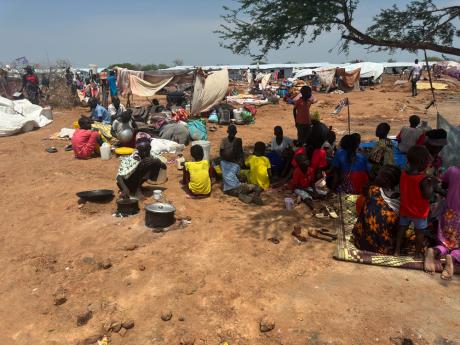
Reaching Renk and meeting the need
The location of Renk on South Sudan’s most northerly extremity makes a response difficult, not to mention expensive, to reach from other parts of South Sudan as Mathou explains. ‘The problem in Renk, is that for you to come out of Renk to reach other parts of the country is very difficult. It is only possible by air. From the other side in Sudan, it is closer, and you can charter a bus or truck to come by land; although it is very difficult because there are so many checkpoints where you can be robbed, meaning people coming from Sudan have nothing when they arrive.’
Choices are severely limited for those without material means - the majority of the 2,000 people arriving at the border every day. ‘The majority of the refugees don’t have means. They are vulnerable. If these people had means you would not even have a camp, these people would be renting houses somewhere,’ says Tom pragmatically pointing out that no-one chooses to be a refugee.
Tom praises the open-door policy instigated by the Government of South Sudan to protect those fleeing the violence. ‘We really have to appreciate the government of South Sudan for opening its border to people who are fleeing, despite the challenges they are facing as a country. They have put policemen there, and that is working very well, but as the population continues to grow, the policemen cannot be everywhere, particularly at night, so the risk of gender-based violence and sexual exploitation needs to be addressed, because these are vulnerable people.’
The problem in Renk, is that for you to come out of Renk to reach other parts of the country is very difficult. It is only possible by air.
Costly crisis
The response, being led by the UN agencies - UNHCR (United Nations High Commission for Refugees) and IOM, (International Organisation for Migration) aims to relocate returnees to their home communities where they have family support networks. Not everyone has a home to go to, however, and some are being relocated to other camps established during the recent South Sudan civil war. Tom explains why this may be a bad idea. ‘Strategically, it is like moving from the frying pan into the fire,’ he says. ‘Facilities made for other emergencies, are being tapped to address another emergency which causes problems in a host community where people are already deprived of some resources. When you are prioritising one group and leaving the other it can create a conflict.’
The commitment of the international community is key if a further humanitarian crisis is to be averted. But with so many other humanitarian crises competing for the world’s attention – the Sudan crisis is at risk of being forgotten. A chronic lack of humanitarian funding is the worrying result as Tom explains. ‘The biggest issue is the constrained resources. The humanitarian response is only 10% funded and the help being delivered is being funded by crises that have been there before. We already have another camp sprouting which is ignored and neglected,’ he says.
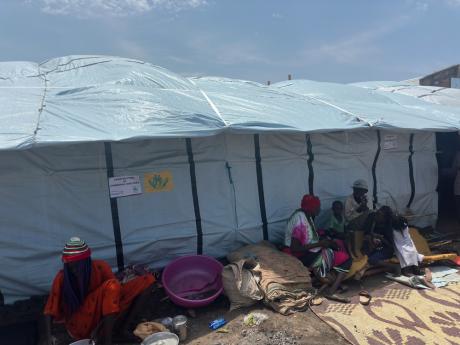
100 days
100 days since the conflict ignited, 3,977 people have been killed, 2.6 million displaced and 571,239 fled into neighbouring countries as refugees, including 190,277 who have arrived in South Sudan. South Sudan’s porous borders mean that Renk is not the only frontline in a crisis that experts warn is rapidly escalating into a full-blown civil war. The deteriorating situation in southern Dafur is pushing people over the border at Gok Machar (Kiir Adem), north of Aweil, where camps are springing up and growing quickly. Future flights may include locations around Aweil where refugees are expected to arrive in greater numbers.
As hard as the humanitarian situation is, nothing could be worse than atrocities being reported including the ethnic killing of 87 people found in two mass graves in El Geneina. The murder of a State Governor Khamis Abdullah Abakar following his condemnation of attacks against the Masalit People of Western Darfur in June shows that no-one is safe.
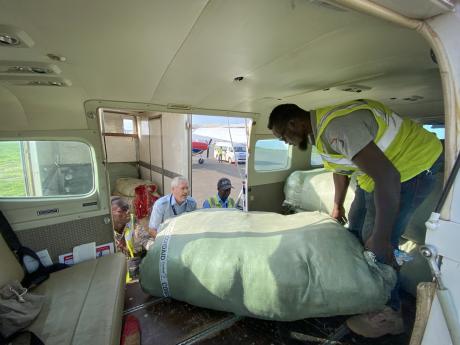
Beyond Renk - 100 days and 190k refugees
The mosquito nets, soap and blankets flown by MAF arrived safely in Renk and were immediately put to good use helping to stop malaria and prevent waterborne and respiratory diseases claiming more vulnerable victims amongst the 191 thousand people that have crossed the border so far. Getting aid and humanitarian workers safely to their destination, is a small but significant contribution in the most dangerous country in the world to be an aid worker, where road and river aid convoys are often targeted by armed bandits.
Speaking on behalf of his colleagues, Tom passed on his thanks to MAF. ‘Honestly, we just want to appreciate MAF. Yesterday, we saw first-hand your mission of flying for life, we really appreciate it. Tobias is a very experienced pilot who understands his trade. It was an honour flying with him to Renk. MAF are contributing to this response and that cannot be underestimated. You are doing so much. We really appreciate it and are proud to be associated with MAF. Let us continue saving lives because that’s what we do best at Cordaid.’
MAF are contributing to this response and that cannot be underestimated. You are doing so much. We really appreciate it and are proud to be associated with MAF. Let us continue saving lives because that’s what we do best at Cordaid.